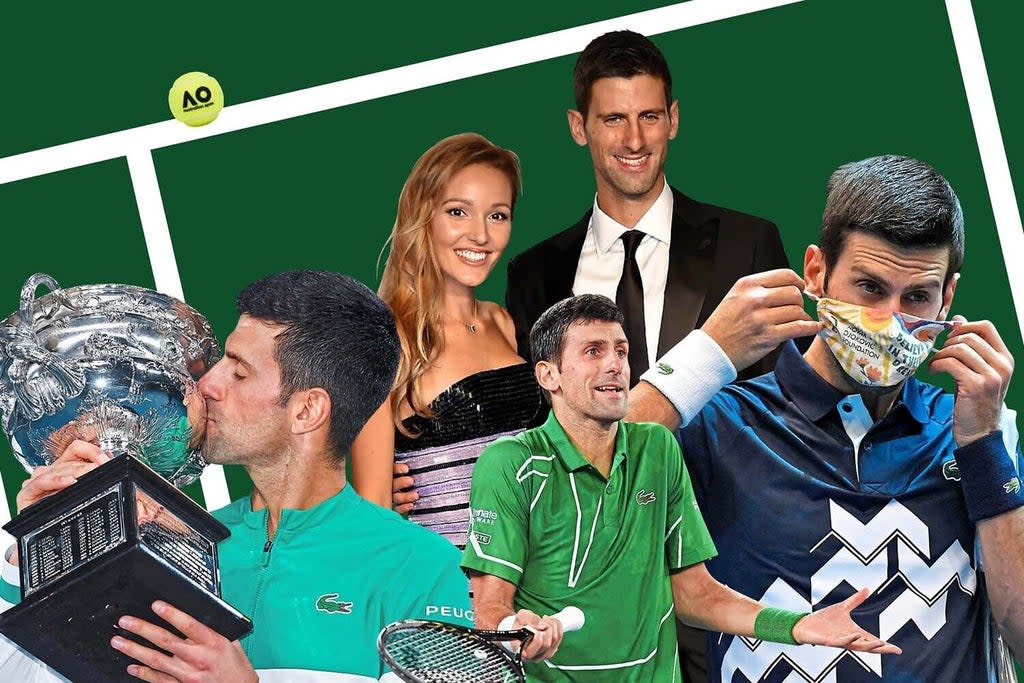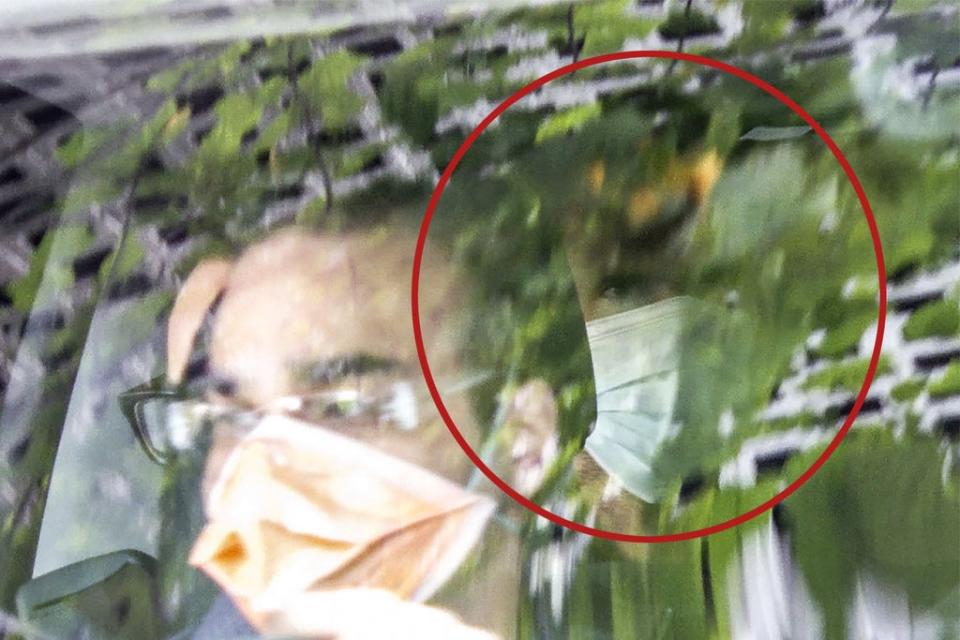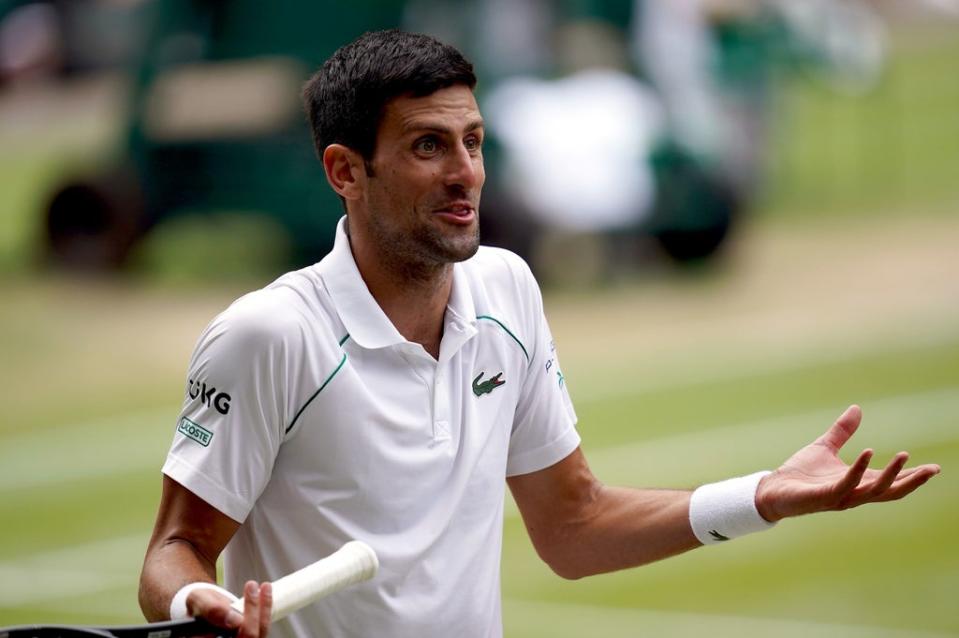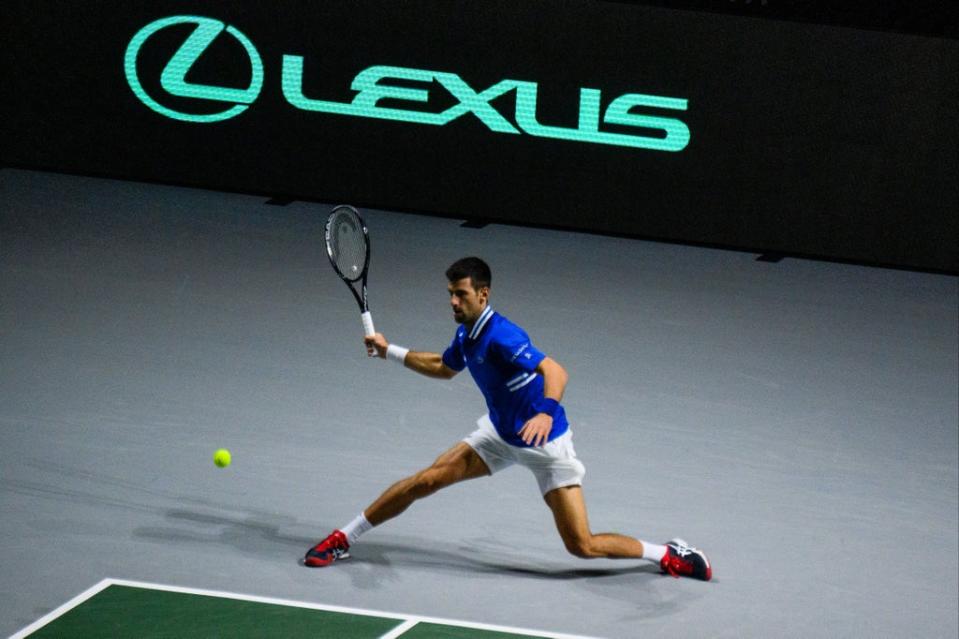How Novak Djokovic became the world’s most divisive athlete

It’s the on-again-off-again relationship the world can’t get enough of: champion tennis star Novak Djokovic and his Australian visa.
After having a previous revocation order overturned, immigration minister Alex Hawke has now cancelled the visa. As a result, Djokovic is set to be detained by immigration officers from 8am on Saturday until his legal battle with the Australian government is resolved.
Like anyone travelling to the country, all professional tennis players arriving for the Australian Open must be vaccinated or in receipt of a medical exemption. Djokovic, who in April 2020 described himself as “opposed to vaccination”, fell into the latter camp. Or at least so he thought.
While in the air, it transpired that he was planning to enter Australia on a visa that apparently did not permit exemptions for the unvaccinated. It was promptly cancelled. Djokovic was interrogated by border force officials for several hours before being taken to the Park Hotel in Melbourne’s Central Business District. At the time, his wife Jelena wrote on Instagram: “The only law that we should all respect across every single border is Love and respect for another human being. Love and forgiveness is never a mistake but a powerful force. Wishing you all well!” His mother, Dijana, said: “It’s not fair. It’s not human. I hope that he will win. Terrible, terrible accommodation. It’s just some small immigration hotel, if it’s a hotel at all.”
On Monday morning, a judge ordered his immediate release and the nine-times Australian Open champion looked set to defend his title. Whether Djokovic plays the tournament or not, the events of the last few days have sparked huge controversy around the world and a furious reaction in his native Serbia, where the term ‘national hero’ does him a disservice.
Yet, for those who have followed Djokovic’s career, this incident hasn’t come as a total surprise, nor is it the first time that a man who yearns for love and universal acclaim has become a figure of mistrust and disdain.

Professional athletes are consumed by what goes into their bodies. A plate of dodgy sushi the night before a big match can have serious consequences. Worse still, a supplement from a coach that later transpires is on a banned list could lead to a player suspension and forgoing millions of dollars. Novak Djokovic takes clean-living to extremes.
Growing up in Serbia, his parents ran a pizza and crepe restaurant in Kopaonik, a ski town 200 miles south of the capital Belgrade. It may sound like an idyllic diet for any child, were it not for the fact that two decades later, Djokovic discovered he was celiac and advised to avoid wheat, dairy and tomatoes. Three ingredients somewhat critical to the pizza-making process.
Prior to this discovery, in 2010, Djokovic was viewed as a hugely talented player but a physical lightweight. He was so renowned for pulling out of matches and citing a variety of physical ailments that after one such incident at the 2008 US Open, American player Andy Roddick jokingly suggested Djokovic may have been suffering from “bird flu, Anthrax, SARS.”
It’s not the first time that a man who yearns for love and universal acclaim has become a figure of mistrust and disdain
Following a change in his diet, which is now plant-based, and an overhaul of his daily routine – which he told the New York Times last year, involves getting up before dawn, watching the sunrise and taking part in hugging and singing sessions with his family – Djokovic promptly became the number one player in the world, dominating not only 2011 – in which he won three major titles – but the entire decade.
It is understandable why he should be so careful about what he puts in his body. The trouble is, he has brought this approach to much of scientific orthodoxy and is on record as being opposed to allowing another foreign agent into his body: vaccines.
Tennis has long been characterised by great rivalries with sharp contrasts. The metronomic baseline play of Chris Evert versus the relentless serve-and-volley of Martin Navratilova; Bjorn Borg’s ‘Ice-Man’ personality juxtaposed with John McEnroe’s ‘Superbrat’. And men’s tennis was in rude health at the end of 2006. The Roger Federer-Rafael Nadal rivalry was approaching its zenith, and no one – least of all their legions of fans – was calling out for a third man.

Yet there was Novak Djokovic, about to storm the tennis world – or ruin the party, depending on your perspective. And that sense of three being one too many – that supporters had already picked a side, Federer or Nadal – has haunted the Serb’s career.
“People love Federer and Nadal,” says Christ Bowers, author of Novak Djokovic and the Rise of Serbia. “Federer is streaks ahead on diplomacy and Nadal is lovely. Djokovic is a warrior. He can be very dignified for large stretches but then it all comes out.”
Djokovic may be the most complete tennis player of the modern era. A better backhand than Federer and a more powerful serve than Nadal, his movement on the ubiquitous hardcourts of the tour represents several evolutionary leaps. Yet he lacks the easy diplomatic skills of Federer and Nadal, or at least he is able to hide his annoyance less easily. He can be tetchy, and fails to understand why he does not get the respect and love that come so naturally to his great rivals, locked together on 20 major titles apiece.
“He’s arguably the greatest player of all time but doesn’t feel he doesn’t get the credit for it,” says Bowers. Djokovic, who speaks fluent English, often feels as if his good intentions have been lost in translation. His behaviour during the Covid-19 pandemic provides an insight into why that might be.
Neither Federer nor Nadal organised an exhibition tennis tournament, the Adria Tour, in June 2020 – at a time when international sport had largely shut down – with full stadiums and no social distancing, which turned into a full-on super-spreader event. They also didn’t do an Instagram live with ’wellness’ guru Chervin Jafarieh to proclaim that gratitude can transform “the most toxic food, or maybe most polluted water into the most healing water.” And they certainly would not attempt to show up in Melbourne, a city that has endured one of the longest and strictest lockdowns of any major city in the world, in a state where 92.6 per cent of the population is double vaccinated, via a legal loophole.
“One of Djokovic’s weaknesses is he often doesn’t read the room,” Bowes says. “He’s not appreciated the strength of feeling about unvaccinated people that currently exists, especially in Melbourne. He is a very sensitive man but he has blind spots.”

Sometimes his preference for the spiritual and aversion to accepted science has damaged his career, as it did in 2017 when he delayed career-saving elbow surgery. But his beliefs may also have impacted others.
The Adria Tour is one example, but so is his vaccine status, which Djokovic kept secret all last year, adopting a policy of strategic ambiguity. This cannot necessarily be said to consequence-free.
As the world’s most famous Serb, he is revered in his home country. Yet Serbia has witnessed high levels of vaccine hesitancy, and only 45 per cent of the population has received two doses. While some of this can be attributed to long-standing mistrust of state institutions, it seems plausible that a strong pro-vaccine statement from Djokovic might have made a substantial difference in the country.
It is hard not to feel some sympathy for Djokovic. He was given assurances by Tennis Australia and the Victorian Government that he would be able to enter the country and compete at the event. And now he has gotten caught up in a political game, during an election year. But ultimately, this extends only so far, as has been made clear by his peers. His great rival, Rafael Nadal, said of the situation, if he wanted, he could be playing in Australia without a problem. “He made his own decisions, and everybody is free to take their own decisions, but then there are some consequences.”

Even if Djokovic competes in the Australian Open, Bowes believes his chances of winning a record tenth title have now gone. “Whether he makes it past the first few rounds, at some stage he’ll need to call on the reserve tank and it’ll be empty.”
At the heart of the issue is two competing philosophies. Djokovic – like so many people opposed to vaccination – sees it as merely exercising the right to determine what goes into his body, after years of struggling with his diet and fitness. Many Aussies view it as a wealthy, privileged man trying to evade the agreed rules of a strictly egalitarian society.
Whether Djokovic wins a record-breaking 21st major title or crashes out in the first round, one thing is clear: his ultimate internal conflict – that burning fire to maintain agency and sovereignty over his body and decisions – versus his desire to be loved, is nowhere near closer to being resolved.


